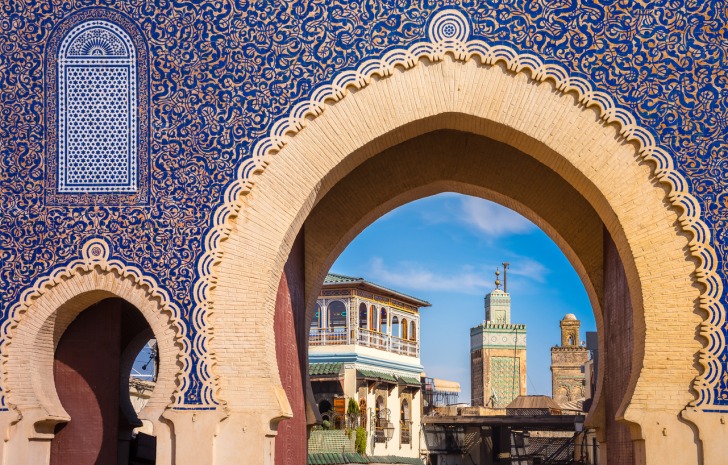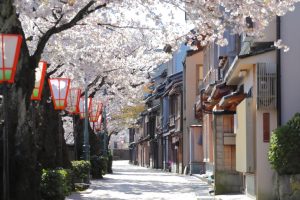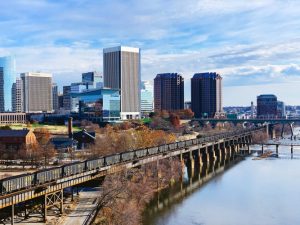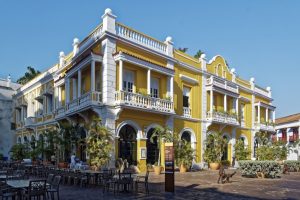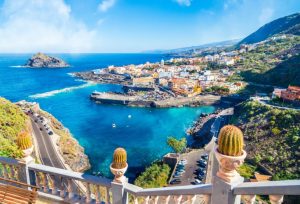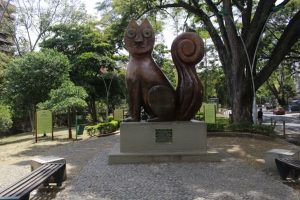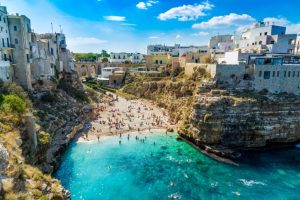Fes is a large city in Morocco with nearly 1.3 million inhabitants.
Historically, it was known for being one of the few places you could get a brimless red felt hat, hence the name of the city.
However, it’s a destination for traditional crafts, trade, and tourism today.
While many travelers skip a trip to Fes, it’s worth a look.
With a huge population and many sites to see, it’s safe to say it’s worth stopping.
That said, you’ll want to ensure you’re safe on your trip to Fes.
Below, we’ll help introduce you to how safe Fes is and what you should look out for.
Warnings & Dangers in Fes

OVERALL RISK: MEDIUM
Fes is generally safe for tourists, and the locals are very hospitable. However, travelers should take certain precautions while visiting the city. This includes avoiding going out in the early morning or staying out until dusk. Additionally, pickpocketing and petty crime run rampant in touristy areas.

TRANSPORT & TAXIS RISK: MEDIUM
Taxis and other types of transportation in Morocco are generally safe for tourists. Despite that, there are still instances where travelers should keep an eye out, including unregistered taxis. Unofficial taxis often attempt to pick people up and charge ridiculous rates or try to rob travelers. If you're visiting Fes, it's best to only use official taxi companies listed by your hotel.

PICKPOCKETS RISK: MEDIUM
Fes has a moderate level of petty crime, including pickpocketing. Most of the time, theft will happen in areas where tourists are most likely to go. To avoid this, keep your valuables close to you and be aware of your surroundings. It also helps to avoid wearing anything expensive and to only carry as much cash as you need for the day.

NATURAL DISASTERS RISK: MEDIUM
Morocco's only major natural hazards are droughts, floods, wildfires, and earthquakes. Travelers should be weary and familiarize themselves with safety measures. Flooding is the most common occurrence, so travelers should avoid visiting during rainy months. In addition, earthquakes do happen frequently, and travelers should know what to do in an emergency.

MUGGING RISK: MEDIUM
While Fes is known for being safe for travelers, it's important to remember that there will still be crime no matter where you go. Fes's mugging rate is moderate and tends to happen during sketchy hours. The best thing to do is to be mindful of your surroundings, only travel during the day, and not have anything valuable to yourself that could attract attention.

TERRORISM RISK: HIGH
There is a high risk of terrorism, especially for travelers or foreigners in the area. Numerous news reports have been made of terrorists targeting popular areas or finding foreigners to harm. If you're traveling to Fes, staying weary of your surroundings is important.

SCAMS RISK: HIGH
The scams are very organized in Morocco, with many people looking legit. The most popular scams include locals taking pictures of travelers, then dropping their cameras and asking the traveler to reimburse them. In addition, surprise charges may occur when dining, even if an item seems free. Many fake items on the market are being sold at a high price. Lastly, there are fake tour guides and direction givers.

WOMEN TRAVELERS RISK: HIGH
Female travelers tend to get a lot of unwanted attention in Fes. There are many instances of harassment toward foreign women, such as catcalling, hissing, staring, and more. It's best not to travel solo and have other groups of men around them when visiting.

TAP WATER RISK: MEDIUM
Most tap water is safe, but establishments may not serve well-filtered water. This can result in kidney stones if you're not used to it. To be safe, the best method is to carry water bottles or use a water purifier.
Safest Places to Visit in Fes
The safest places in Fes to visit are the touristy areas that cater to a large audience.
This can also include areas that are going to draw tourists.
For example, many people say visiting the Medina of Fes el-Bali, Bou Inania Madrasa, and the AL-Attarine Madrasa is safe.
Staying in The Ville Nouvelle is the safest, as it is the newer part of the city.
Those looking for museums may also want to check out the Dar Batha Museum and the Bab Bou Jeloud, an old gate to the old town of Fes.
Tourists are encouraged to stay close to the Blue Gates in Fes, specifically around Hotel Batha.
These areas are generally for tourists and have more security than other places.
Many travelers tend to be safe walking around the city during the day.
As long as you know your surroundings, don’t keep anything expensive on you, and only carry a small amount of cash, your chances of being a target are slim.
That doesn’t mean you should travel everywhere in the city.
Like other places, Fes has areas that aren’t safe for tourists to go.
Below, we’ll give a breakdown of those areas.
Places to Avoid in Fes
Many places in Fes are safe for tourists to travel to, but some areas still pose a risk.
Many travelers state that you should avoid the Old Medina because of the narrow streets.
The streets are also winding with many alleyways, which can be a good place for petty crimes.
Many travelers also get lost, making them an easy target.
Other than that, most touristy places are safe to visit during the day.
Travelers should use common sense when traveling, such as avoiding traveling at sunrise or dusk.
They should also avoid carrying anything expensive, as that could make them the target of petty crimes.
Sticking with a group will be your best bet if you’re a woman traveler.
While catcalling and harassment are rampant, most areas won’t have these problems.
In addition, many locals are friendly and are willing to keep you safe.
That said, use common sense when you’re out and about and keep your eyes open.
Safety Tips for Traveling to Fes
- Don’t Have Valuables – The most common crime in Fes is petty crime against tourists. People who have expensive jewelry, cameras, or loads of cash are targeted. When traveling, you’ll want to minimize the expensive items you have. In addition, wearing modest clothes can help.
- Avoid Empty Alleys – This goes anywhere in the world, but you will want to avoid any empty alleys or narrow passageways. These areas are often perfect for cornering victims, which organized groups tend to do. If you’re traveling, stick to busy areas that have a wide and open pathway.
- Stay in Well-Lit Areas – While staying out after dark is not recommended, if you find yourself in this situation, stick to well-lit areas. Men will have less risk of walking around at night, whereas women will need to be extra cautious. If you’re out during these hours, it’s best to stick with a group or to call an official taxi or cab to pick you up. That way, you can avoid walking outside alone.
- Only Use Official Taxis – In Morocco, it’s common to see “fake” taxi companies attempting to pick up travelers. These taxis often charge a ridiculous amount after the ride or will attempt to rob you. If you’re going to travel in Morocco, it’s recommended that you only use a list of taxis provided by your hotel staff.
- Deny Extra Items – Another common scam that typically happens to tourists is that shop owners or restaurants make it look like they are providing free food or services. However, they then attempt to charge you at the end. If you’re traveling, it’s best to always deny anything that seems too good to be true.
- Dress Conservatively – It’s important to note that Fes has a population of 99% Muslims. The main religion in the area is Sunni Islam, with the following being Christianity. If you’re traveling, it’s best to dress modestly and not wear skimpy outfits. This means keeping your arms, legs, and chest covered.
- Say No to Tour Guides – A common scam is that a local will claim to be a travel guide for tourists. At first, they will say they are asking for no money and will simply guide you to famous places around town. However, after they take you around, they will take you to their shops or attempt to ask you for money. If they approach you, it’s best to decline the offer.
- Negotiate Taxi Prices Upfront – If you use public transportation, even an official taxi, get a price upfront. Drivers often attempt to scam by saying that their meter is broken or charging premium prices. You should always negotiate the rates upfront and say you only have enough to get from point A to point B.
- Get Travel Insurance – travel insurance may not seem necessary, but it can come in clutch. It can cover various fees, including replacing stolen items, helping with scams, and even being used to pay medical bills abroad. Travel insurance may sound costly, but it’s well worth the price if you’re heading to a place with risks.
- Stay in the City – It’s safe to say that most tourists will stick to tourist areas. However, staying inside the city is important, particularly in the newer areas. The number of petty crimes outside the city is very high.
So... How Safe Is Fes Really?
If we were to give a rating, we’d rate Fes at a steady 6/10 for a safety rate.
Traveling to this city involves a lot of petty crime and risk.
While it has many wonders to explore, there are also plenty of places that will prey on tourists.
If you’re traveling, remember these tips and plan out your trip beforehand.
Otherwise, you could find yourself in a difficult situation.
It’s also safe to say traveling in a group is your best bet.
It should be noted that Fes’s crime rates have been dropping over the years.
However, that doesn’t mean that nothing can happen.
Fes is generally safe during the day, but just keep aware of your surroundings and be respectful.
That will get you a long way in this country and city.
How Does Fes Compare?
| City | Safety Index |
|---|---|
| Fes | 51 |
| Marrakech | 56 |
| Casablanca | 45 |
| Calgary (Canada) | 82 |
| Buenos Aires (Argentina) | 60 |
| Vancouver (Canada) | 82 |
| Cordoba (Argentina) | 61 |
| Toronto (Canada) | 81 |
| Melbourne (Australia) | 80 |
Useful Information

Visas
Tourist visas are required by law to travel to Morocco. If you're a US green card holder, you must apply for an e-visa to visit Morocco, even if it's just for a few days. Otherwise, you will be rejected and turned back at the airport.

Currency
The currency in Morocco is the Moroccan dirham (MAD), a closed currency. Travelers should exchange their money at the Bureau de Change. These are exchange offices located in tourist areas. There are also a handful at the airports that are safe to use. Do NOT try to exchange money outside these areas, as they are likely scams.

Weather
August is the hottest month in Fes, with a temperature of 81 degrees Fahrenheit. If you're traveling, it's best to visit from May through September, as the climate is hot with dry summers. Winters tend to be mildly rainy and can get colder.

Airports
The major airport in Fes is the Fes-Sais Airport.

Travel Insurance
Many recommend travel insurance, as it can help protect you during your stay. If you're traveling, it's best to see what your options are and get a quote as it can help in an emergency.
Fes Weather Averages (Temperatures)
Average High/Low Temperature
| Temperature / Month | Jan | Feb | Mar | Apr | May | Jun | Jul | Aug | Sep | Oct | Nov | Dec |
|---|---|---|---|---|---|---|---|---|---|---|---|---|
| High °C | 17 | 18 | 21 | 22 | 26 | 31 | 36 | 36 | 32 | 27 | 21 | 18 |
| Low °C | 5 | 6 | 8 | 9 | 12 | 16 | 19 | 19 | 17 | 14 | 9 | 6 |
| High °F | 63 | 64 | 70 | 72 | 79 | 88 | 97 | 97 | 90 | 81 | 70 | 64 |
| Low °F | 41 | 43 | 46 | 48 | 54 | 61 | 66 | 66 | 63 | 57 | 48 | 43 |
Morocco - Safety by City
| City | Safety Index |
|---|---|
| Casablanca | 45 |
| Fes | 51 |
| Marrakech | 56 |
